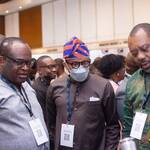Implementation of the Cylinder Recirculation Model (CRM) will kick-start in the Greater-Accra and the Ashanti Regions today.
It will then be extended to the other regions across the country.
The CRM pilot programme was conducted in the Eastern, Ashanti, and Northern Regions, resulting in valuable lessons for shaping the policy framework.
It starts with sourcing of bulk LPG through importation or local production from local refineries or/and gas processing plant, such as Tema Oil Refinery and Ghana National Gas Company. Ghana produces 40% of LPG locally and imports 60%.
Bulk Import and Distribution and Export Companies (BIDECs) sell LPG in bulk to either the Bottling Plant for the sole purpose of filling the empty cylinders or to the LPG Marketing Companies (LMCs) for bulk sale to industrial end-users – factories, restaurant, and mini-power plants- and also to auto gas users.
The CRM policy involves sending cylinders procured from cylinder manufacturing companies to Bottling Plants for filling.
The Bottling Plants will be responsible for procuring, branding, and maintaining the cylinders.
There will be different sizes of cylinders starting from as lows as three kilogrammes to meet the needs of all income earners.
The needs of users of fibre glass will also be catered for in the coming months.
Out of four bottling plants, two are to start the programme today while remaining two are expected to join before the end of this month.
The filled cylinders will be transported in bulk road vehicles or specialized trucks to depots for holding and sorting before transporting them to cylinder exchange points.
Under the CRM, consumers across the country will no longer need to own Liquefied Petroleum Gas (LPG) cylinders for domestic and commercial purposes.
The programme has established exchange points where customers can pay for the filled content of LPG cylinders.
Consumers can swap their empty cylinders for filled ones free of charge but those without their own cylinders will pay a token determined by the retail point for the cylinder.
Consumers are required to register with the Ghana card and other recognized national identity documents will take place at exchange points is crucial for consumer data traceability.
The CRM will run side by side with the current distribution model until the old market structure is gradually phased out in three years.
It would be the responsibility of the LPG Marketing Companies (LMC) to ensure that the cylinders are in good condition before they are handed over to the end user.
It is also mandatory for all the bottling plants to have a minimum maintenance facility to check for leakages and replacement of valves.
There will also be a number of indirect jobs created for installations, maintenance, fabrication and other services.
The implementation of the CRM is to ensure that at least 50% of Ghanaians have access to safe, clean and environmentally friendly LPG by 2030.
It is also meant to improve access to LPG, improve safety in the distribution of LPG and increase adoption of LPG.
It is a policy shift to stop the unnecessary loss of lives and property as well as gas filling stations, mostly due to human error.
CRM will help Ghana achieve a market driven structure that ensures safety in the LPG value chain, and increases access and adoption of LPG as a clean fuel by consumers.
Ghana has unfortunately had its share of activities that continue to deplete the environment.
This brings to the fore the importance of the CRM which will not only create jobs but guarantee the safety of consumers, marketers and all stakeholders in the value chain.
It is, therefore, a policy that must be embraced by all.




